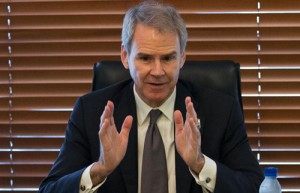The United States (US) envoy to Asean said the “pivot to Asia” was less about increasing its military presence in the region and more about empowering people.
Ambassador David Carden said the US military’s rebalancing toward Southeast Asia “is an aspect of America’s engagement that has been in place for a very long time.”
“The Seventh Fleet has not just shown up in the South China Sea and has not been missing in action in the Asia Pacific. It’s been here. It’s been here for a long time,” he said during an interview with a handful of journalists, including a representative from The Manila Times. Carden was in the country for a host of meetings, including the opening of the Asean Youth Summit in Makati City on Tuesday.
He said the US priority in the region was to empower people, adding that a more prosperous region would benefit not only American interests but the rest of the world.
“The pivot of the United States to Asia and the Asia Pacific is really a pivot to people, empowering people to find a future together and with us,” he said.
Carden traced the present foreign policy to US President Franklin Delano Roosevelt, who highlighted four freedoms in his 1941 State of the Union Address—freedom of expression, religion, fear, and economic freedom. Carden paraphrased from a biography about Roosevelt that quoted the late president as saying that the entire world should have freedom of speech and of religion.
That policy was echoed by the current US president, Barack Obama, in a taped video message that was played at the opening of the Asean Youth Summit.
“Prosperity and peace in the Asia Pacific means more opportunities for all of us, including the United States,” Obama told the delegates. “And I want to make sure that we’re building that future together.”
Carden outlined the broad scope of America’s engagement in the region—including issues like emergency response to natural disasters like that from Super Typhoon Yolanda (or Haiyan by its international codename); environmental issues, like climate change; fighting human trafficking and the illicit wildlife trade; pandemic preparedness and responsiveness; anti-corruption campaigns; and food and water security.
“There’s almost no end to the number of ways in which the United States is engaged,” the ambassador said, adding that was borne out of the recognition of the importance not only of Asean but also of Asia as a whole, including China.
Carden said the world was even more connected today than in Roosevelt’s time—and not just in terms of trade.
Today’s pandemic in Asia, for instance, may be the threat to New York tomorrow, he explained.
“I think that we have to recognize that what is good for the world is also good for us [Americans],” Carden told the Filipino journalists, adding: “The reality was that there were things in Asean that directly affected US interests.”
Asean is the Association of Southeast Asian Nations, a regional bloc of 10 countries that includes the Philippines.
Optimistic about the Philippines
Turning his attention to the country, Carden said, “I’m quite, I would say, optimistic about the Philippines and its position in terms of moving forward.”
“I’m very encouraged by President [Benigno] Aquino’s efforts to manage corruption, his approach to governance,” he said. “And I think you’re doing a lot of exciting things in education.”
The main development in education is the passage of Republic Act 10533 earlier in July. In brief, the new law reforms the basic education system, stretching the years of schooling to 12 years to match the present global standard.
The US seems keen on encouraging young Asians to participate in regional developments and events.
At the Asean Youth Summit, President Obama announced the launching of the Young Southeast Asia Leaders Initiative. In his video message he said, “Your generation will define the Asia Pacific for generations to come.”
Carden underscored that point, saying the country and the rest of Asia need to do more—particularly in implementing the new policies—in the area education.
Besides education, the Philippines and its neighbors need to do more in further improving governance and addressing social inequities and income disparities.
Carden said he was particularly concerned about the widening gap between rich and poor as measured by the Gini coefficient.
Earlier in April, a study published by the Institute of Southeast Asian Studies (ISEAS) reported that the income gap has been worsening despite the rapid economic growth in several countries in the region, like the Philippines.
Citing reports from The World Bank, the ISEAS study reported that the Gini coefficient of the Philippines as of 2006 was 44.04 percent. The World Bank website shows the Philippine Gini coefficient has improved somewhat to 43 percent as of 2009.
A ratio of 1 or 100 percent means maximum inequality. A society with full equality will have a ratio or index close to zero.
To address the inequality issue, the ISEAS study recommends reforms in education to level the economic playing field.
Carden would likely agree. He said the Philippines and other countries in Asia need people who are trained to participate.
He said the US was doing its part by offering opportunities for Asians to study in the US through the Fulbright program, scholarships for women scientists, and other similar initiatives.
Carden, a lawyer by training and profession, was appointed to his post in 2011. Since then, he said that he has logged some half million miles crisscrossing the region, where he hopes to be known later on in life as the best friend of Southeast Asia.


